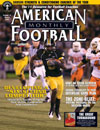AMERICAN FOOTBALL MONTHLY THE #1 RESOURCE FOR FOOTBALL COACHES
Article CategoriesAFM Magazine
|
FROM POP WARNER TO PREP SUPERIORITYby: AFM Editorial Staff© More from this issue How Bill Powers, a former Pop Warner coach, has turned a small Christian high school into a powerhouse in the football hotbed of Florida Can’t blame Bill Powers much for pinching himself once in awhile to make sure this is all real. After all, how else would you explain a former Pop Warner coach with no prior high school coaching experience turning a doormat of a football program into Florida’s winningest prep team in the last four years? “I really don’t know if there is another story in the world like mine,” he said from a cell phone on his way back from delivering a sold-out clinic session on special teams that was sponsored by Nike in Orlando. “But I seriously doubt it.” The roots of his success go back over twenty years ago when he played alongside former NFL All-Pro ....The full article can only be seen by subscribers.
|
|
|||||||
| HOME |
MAGAZINE |
SUBSCRIBE | ONLINE COLUMNISTS | COACHING VIDEOS |
Copyright 2025, AmericanFootballMonthly.com
All Rights Reserved





